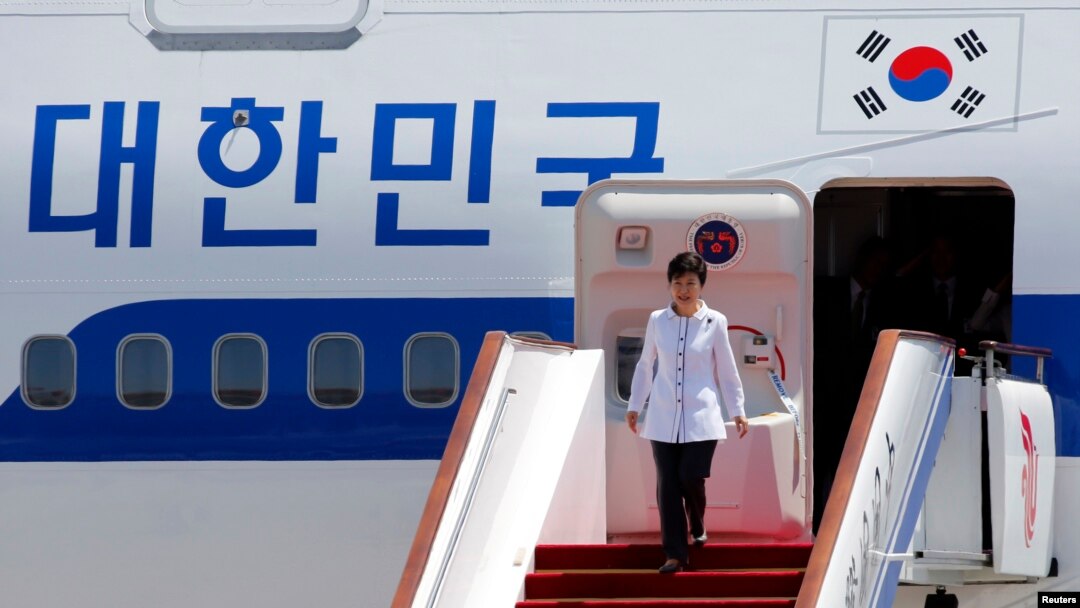South Korean President Park Geun-hye has arrived in Beijing for a four-day summit with Chinese leaders, with North Korea expected to top the agenda.
President Park meets with Chinese President Xi Jinping on Thursday. It is their first meeting since both leaders recently took over the top leadership spots in their countries.
The self-taught Mandarin speaker hopes to use the summit to expand bilateral economic ties and present a unified front against North Korea, China's traditional ally.
She told South Korean media this week she will look to "harden China-South Korean cooperation" in order to get Pyongyang to abandon its nuclear weapons and participate in "sincere" talks.
China has grown frustrated with Pyongyang, which carried out a provocative long-range rocket launch and third nuclear test. In response, Beijing backed expanded U.N. sanctions against the North and cracked down on North Korean banks.
Seoul and Beijing are expected to renew their calls for North Korea to return to long-stalled six-nation talks on dismantling North Korea's nuclear weapons program. Pyongyang, which abandoned the talks in 2009, recently hinted it is open to fresh nuclear talks, but has given no sign it is willing to make major concessions.
Park, who is being accompanied in Beijing by a large business delegation, is also expected to push for strengthened economic cooperation with China. Her office says the two sides are expected to discuss a free-trade pact.
China is South Korea's biggest trading partner. Unlike many developed nations, South Korea runs a trade surplus with Beijing, which exports a large amount of cars, smartphones, and other electronics into China.
Chinese state media on Thursday said Park's visit is expected to "open a new chapter in bilateral relations" between Seoul and Beijing and will add "fresh momentum" to economic ties.
The commentary in the official Xinhua news agency also said the visit could "breathe new life into stalled talks on the Korean peninsula."
President Park meets with Chinese President Xi Jinping on Thursday. It is their first meeting since both leaders recently took over the top leadership spots in their countries.
The self-taught Mandarin speaker hopes to use the summit to expand bilateral economic ties and present a unified front against North Korea, China's traditional ally.
She told South Korean media this week she will look to "harden China-South Korean cooperation" in order to get Pyongyang to abandon its nuclear weapons and participate in "sincere" talks.
China has grown frustrated with Pyongyang, which carried out a provocative long-range rocket launch and third nuclear test. In response, Beijing backed expanded U.N. sanctions against the North and cracked down on North Korean banks.
Seoul and Beijing are expected to renew their calls for North Korea to return to long-stalled six-nation talks on dismantling North Korea's nuclear weapons program. Pyongyang, which abandoned the talks in 2009, recently hinted it is open to fresh nuclear talks, but has given no sign it is willing to make major concessions.
Park, who is being accompanied in Beijing by a large business delegation, is also expected to push for strengthened economic cooperation with China. Her office says the two sides are expected to discuss a free-trade pact.
China is South Korea's biggest trading partner. Unlike many developed nations, South Korea runs a trade surplus with Beijing, which exports a large amount of cars, smartphones, and other electronics into China.
Chinese state media on Thursday said Park's visit is expected to "open a new chapter in bilateral relations" between Seoul and Beijing and will add "fresh momentum" to economic ties.
The commentary in the official Xinhua news agency also said the visit could "breathe new life into stalled talks on the Korean peninsula."


